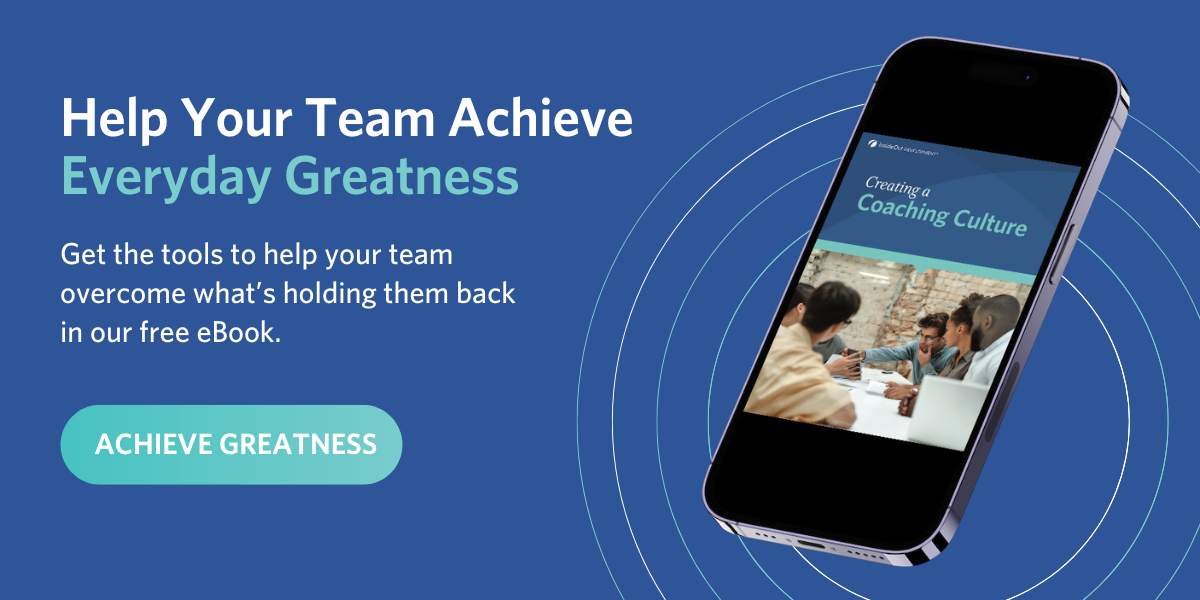Coaching is an excellent way to help an organization. But have you considered how to implement it and make it stick for everyone in your organization—from executives to individual contributors?
And it is incredibly important for your individual contributors to buy into whatever level of coaching program you are trying to implement, as they are one of the largest sections of employees that will be affected by it. You also want them to see that this program will positively impact them as individuals, not just the organization as a whole.

9 Benefits of a Coaching Culture for Individual Contributors
Here are a few of the key benefits a coaching culture targeted at individual contributors can have in your organization.
- Individual contributors will receive feedback. One of the top desires of individual contributors within organizations today is to receive regular feedback on their performance within an organization. This doesn’t just involve hearing praise for what they’ve achieved, but also pointers on where they can further improve. Individual contributors do not want to become stagnant. An organization-wide coaching culture is meant to ensure just that they don’t, that individual contributors receive the feedback they want and can take their own improvement into their hands.
- Individual contributors will be heard. A coaching culture will enable individual contributors to be able to reach across the hierarchical divide and professionally and respectfully communicate with managers with suggestions for improvement. This serves multiple purposes, first it allows individual contributors to be and feel heard. Second, it shows individual contributors that this coaching really is for everyone within the organization. And third, it allows your individual contributors, who due to their position, naturally have a different viewpoint on a situation than your managers, to give voice to issues that might have otherwise gone unseen and unchanged.
- Individual contributors will gain perspective on their role. Coaching can be used to set and progress toward business priorities, the individual contributors within your organization will be able to see how their work directly relates to your organization’s purpose. How fulfilling, to know that what they do serves a purpose! That their work is not just busy work, but instead a legitimate piece of the puzzle that is your organization, that their contributions help within the big picture.

- Individual contributors will be more productive. Coaching will increase productivity throughout the entirety of the organization. For your individual contributors, they may not see this on an organization-wide scale, but they don’t need to because they will see it on a far more personal level as they reach standards and goals faster while still maintaining, and often increasing, the quality of their performance.
- Individual contributors will have more influence among other individual contributors. Peer-to-peer coaching allows individual contributors to work better within their teams and with other contributors, giving them the opportunity to both give and receive feedback on an even level, and decreasing the amount of times they’ll have to look up the ladder for feedback on simpler situations. This will increase the strength of the teams your individual contributors are a part of and is one of the basic steps to an empowered employee.
- Individual contributors will have more opportunities for learning and development. Individual contributors want to be able to gain more experience, learn new skills, and develop themselves professionally. Coaching helps them to do that. In part, because it gives the opportunity for individual contributors to ask for those opportunities, but also because it creates a culture where they can take risks with less fear because they’ll have support whether their risks are successful or a failure for the to learn from.
- Individual contributors will trust and be trusted more by others. Coaching increases trust between managers and individual contributors, consequently strengthening those relationships and allowing for more open communication, and more collaboration. This too will improve team effectiveness and team productivity.
- Individual contributors will be motivated and empowered. Because of an increase in productivity, and more opportunities to engage with problems using their own solutions, individual contributors will feel less as though they are being directed, and more like they have control of their progress. This empowerment is an incredible motivator, and that added motivation only serves to increase their ability to empower themselves.
- Individual contributors will feel empowered to take ownership of results. The best coaching approaches encourage coachees to set their own goals and determine their own Way Forward. People are more committed to action plans when they had a say in creating them.

Coaching Creates Engaged Employees
This is perhaps one of the greatest and most important results of implementing an organization-wide coaching culture. Individual contributors who are motivated in their work, individual contributors who have ownership over their work, individual contributors who can see their work as it plays a role in the organization’s purpose, these individual contributors are empowered and engaged employees.
The results of having empowered and engaged employees cannot be underestimated. Empowered employees lead to a more collaborative teams, more innovative solutions, and a more productive organization. Coaching in and of itself helps the individual, a coaching culture works to help the entire organization.
Beyond the impact on the organization as a whole, empowered, engaged contributors, who feel like their voices are heard, are generally happier, more content employees. And it shows in the numbers, as these coached and empowered contributors have been seen to stay with an organization 40% longer than their counterparts.
That is not to say that their content makes them complacent, in fact, the opposite is true. Empowered employees are driven. There are few things that make an individual contributor feel as though they are capable of success than for them to actually experience success and know that they were behind that success.
Overall, instituting a coaching approach and then creating a coaching culture may not be easy, and your individual contributors may be skeptical to start with. But in the end, your individual contributors may become your staunchest supporters.
Coaching Up for Individual Contributors
One of the benefits of coaching is the enabling your individual contributors to give feedback to not just their fellow individual contributors but also to coach up to their team leads and managers. But this is more than just an opportunity, it is a skill, and one that your individual contributors will have to learn.
Like all elements of coaching, it requires that an individual contributor be engaged in mindfulness. They need to be aware of and understand the wider implications of issues, situations, and problems. This doesn’t necessarily mean on an organizational scale, but they do need to be aware of how the situation effects more than just them personally.
When coaching up there are three things an individual contributor should keep in mind, they can be summed up with one word each. Consideration, Position, and Request. Simply put, this means approaching their team lead or manager with respect, to thoughtfully provide their thoughts on the situation and a possible solution, and to end with an open-ended piece of dialogue that opens the conversation up for further discussion.
Initially, this may be difficult for individual contributors to feel comfortable doing, but that is one reason why it is important to emphasize that coaching is for everyone and to establish a culture where this sort of respectful dialogue is not seen as out of the ordinary, but rather a natural part of the organization.
How Your Individual Contributors Can Get the Most Out of Coaching
But to get all of the benefits of coaching, whether it’s within the sphere of fellow employees or with managers, individual contributors have to put forth effort. Individual contributors won’t receive any of the empowerment that comes from coaching if they are unwilling.
Thankfully, all of the skills or attitudes required to be successful with coaching are things that any individual contributor can do. Though some might find it more difficult than others.
Coaching works best when an individual contributor enters every situation with the self-awareness to know where their skills lie, the humility to accept the feedback they receive, and the willingness to commit themselves to a goal.
Coaching also requires that individual contributors enter coaching conversations with the understanding that their progress is up to them. Successful coaching can’t be done without a good coach, but it is just as impossible without a willing and committed coachee. The flipside of coaches working not as problem solvers but as support systems is that the coachee needs to be willing to put the effort in to solve their own problems.
Coaching is the number one way to drive success for individual contributors in your organization. Target your coaching initiative to every level of your organization. Coaching isn’t only for high-performers or underachievers—it can vastly benefit anyone at every level of the organization.
Learn more about how to build a coaching culture that can drive change at every level of your organization in this article.





